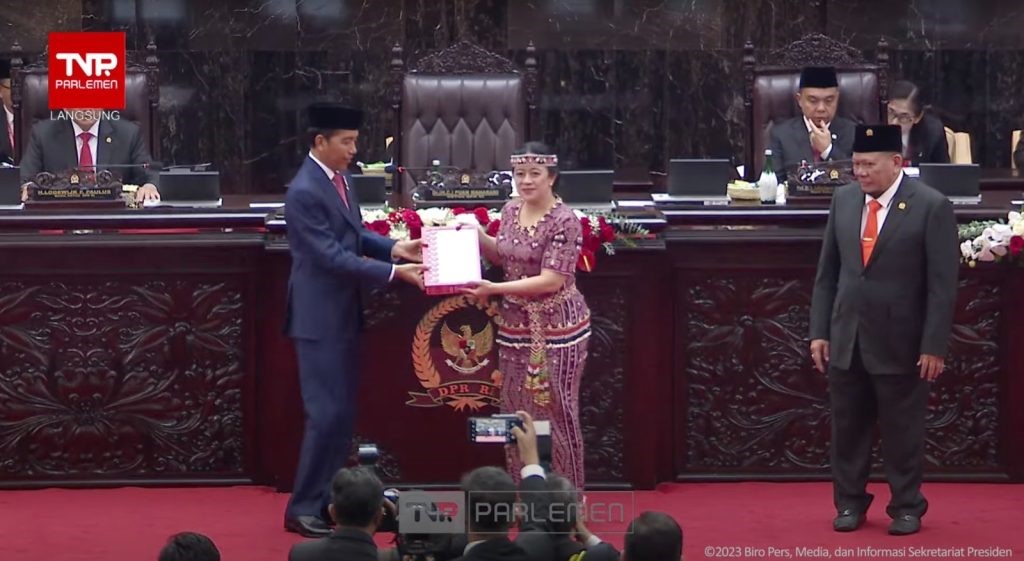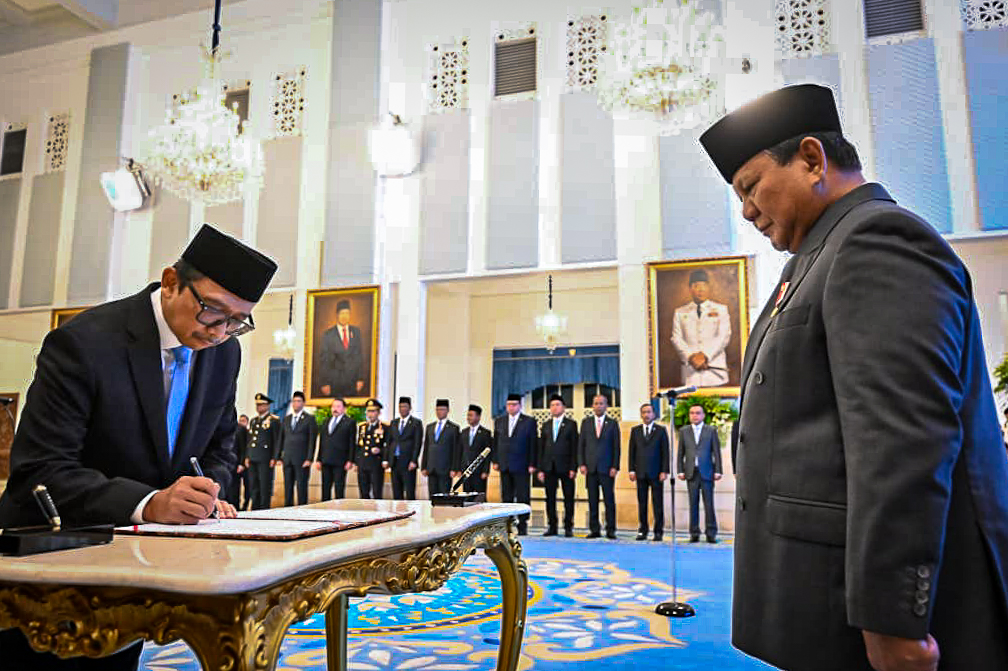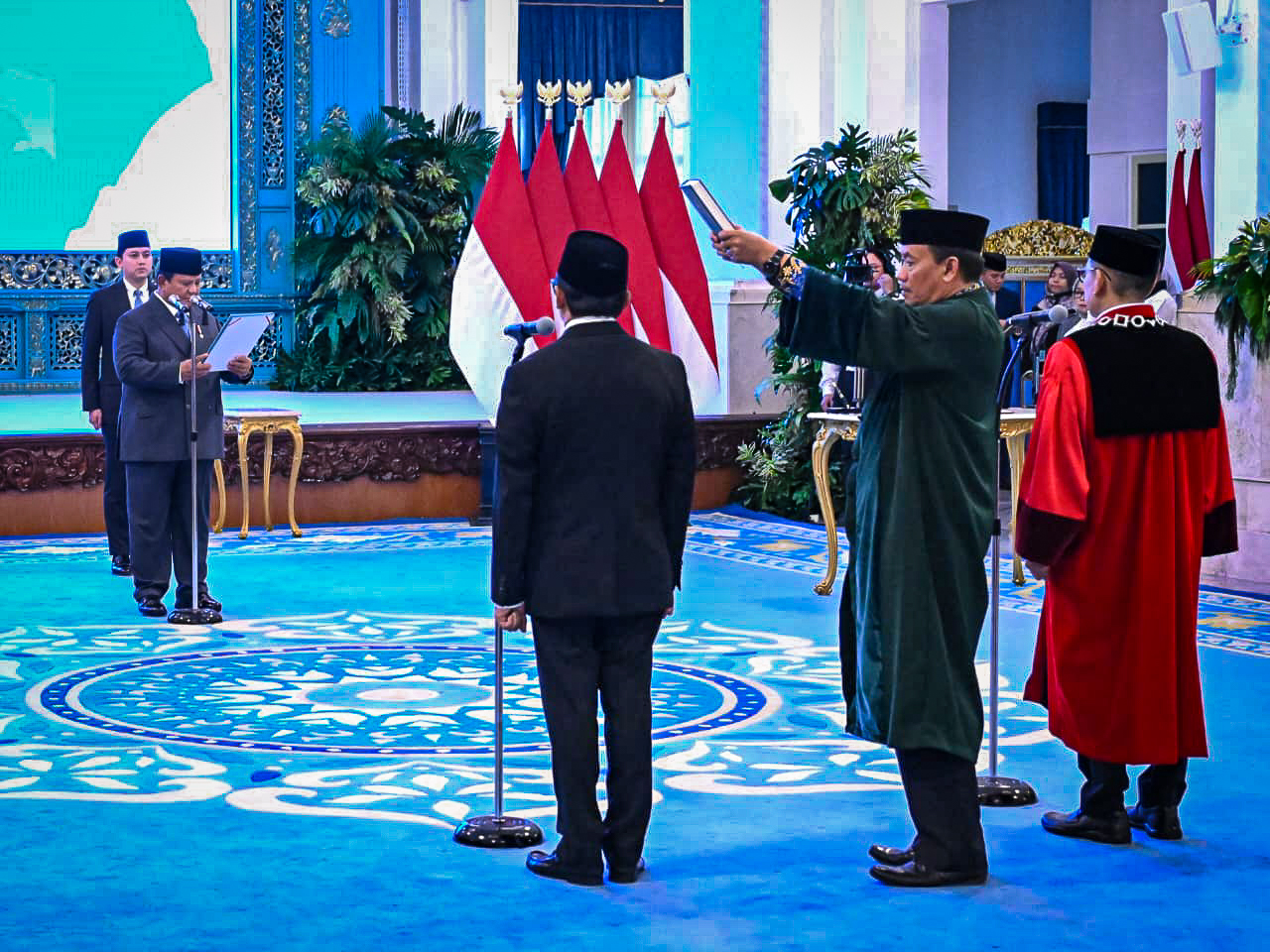Gov’t Projects 2024 Revenue to Reach Rp2,781.3 Trillion

President Jokowi and Speaker of the House of Representatives of the Republic of Indonesia (DPR RI) Puan Maharani during the Government’s Presentation on the Bill on the State Budget for the Fiscal Year 2024 and its Financial Note before the Plenary Session of the House of Representatives, at Plenary Meeting Room, Nusantara Building, MPR/DPR/DPD RI Complex, Senayan, Jakarta, on Wednesday (08/16). (Source: Screenshot)
The Government has projected the 2024 state revenue to reach Rp2,781.3 trillion sourced from tax, non-tax state revenue, and other sources of revenue.
This statement was delivered by President Joko “Jokowi” Widodo at Presentation on the Bill on the State Budget for the 2024 Fiscal Year and its Financial Note before the Plenary Session of the House of Representatives at Plenary Meeting Room, Nusantara Building, MPR/DPR/DPD RI Complex, Jakarta, Wednesday (08/16).
“The state revenue is planned at Rp2,781.3 trillion, consisting of tax revenue of Rp2,307.9 trillion, PNBP of Rp473.0 trillion, and grants of Rp0.4 trillion,” said the President.
For state expenditures, the government has allocated a budget of Rp3,304.1 trillion, consisting of central government expenditures of Rp2,446.5 trillion and transfers to the regions of Rp857.6 trillion.
“A negative primary balance of Rp25.5 trillion is moving towards positive direction. The budget deficit is 2.29 percent of GDP [Gross Domestic Product] or Rp522.8 trillion,” said the President.
The open unemployment rate in 2024 is expected to be reduced to the range of 5.0 percent to 5.7 percent, and the poverty rate is projected to be curbed in the range of 6.5 percent and 7.5 percent. The Gini ratio is anticipated to be within the range of 0.374 to 0.377, and the Human Development Index (HDI) is expected to fall between 73.99 and 74.02.
“The Farmer Exchange Rate (NTP) and Fishers Exchange Rate (NTN) are expected to increase to 105-108 and 107-110 respectively,” he added.
Regarding the optimization of state revenue, President Jokowi emphasized the importance of maintaining an investment-friendly climate, business sustainability, and environmental preservation.
Optimizing tax revenue is achieved through various means, including maintaining the effectiveness of tax reforms for broadening the tax base, enhancing compliance and exploring potential; implementing the core tax system, improving tax governance and administration, implementing the National Identification Number (NIK) as the Tax Identification Number (NPWP) to enhance tax ratio, and providing fair and measurable tax incentives to be able to boost the accelerated recovery and the improvement of national investment competitiveness as well as to stimulate economic transformation.
“To enhance PNBP, ongoing efforts include improving planning and reporting processes using integrated information technology, strengthening governance and supervision, optimizing asset and natural resource management, and promoting innovative services while maintaining service quality and accessibility,” the President said.
Additionally, with an expansive fiscal policy, the Government also strives to maintain financing that remains prudent, cautious, innovative, and sustainable through five aspects.
First, development of Public-Private Partnership scheme, including the reinforcement of the role of State-Owned Enterprises, Public Service Agencies, the Investment Management Institution, and the Special Mission Vehicle;
Second, improvement of the effectiveness of investment financing, especially for State-Owned Enterprises and Public Service Agencies that are directed to complete strategic infrastructure at the Central Government and regional governments, and maintain synergy between financing and expenditure;
Third, financing investments to improve access for low-income people, MSMEs, and ultra-micro businesses;
Fourth, the optimization of accumulated cash surplus to maintain economic stability and anticipate uncertainties; and
Fifth, the improvement of cash management in an integrated manner to maintain a reliable and efficient fiscal buffer.
Furthermore, the President emphasized the importance of a healthy 2024 state budget posture to support economic transformation, development agendas, and to protect the society from turbulence.
“Fiscal reforms must continue to be carried out in a comprehensive manner, through the optimization of revenue, the continued strengthening of quality spending, and innovative and carefully managed financing,” he concluded. (FID/MAY/TGH/DND/UN) (AS/MIA)








